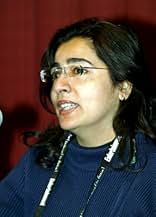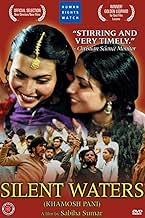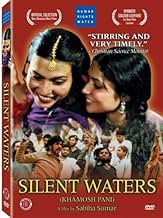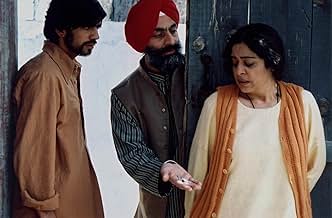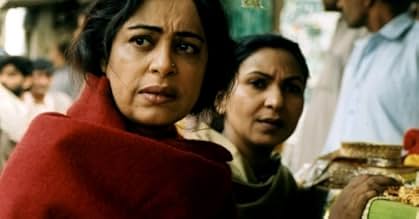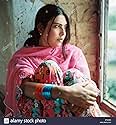ÉVALUATION IMDb
7,5/10
1,3 k
MA NOTE
Ajouter une intrigue dans votre langue1979. A village in Pakistan. A widow sees her 17 years old son being attracted to Islamist militants. It brings her past back.1979. A village in Pakistan. A widow sees her 17 years old son being attracted to Islamist militants. It brings her past back.1979. A village in Pakistan. A widow sees her 17 years old son being attracted to Islamist militants. It brings her past back.
- Director
- Writers
- Stars
- Prix
- 8 victoires et 2 nominations au total
Aamir Ali Malik
- Saleem
- (as Aamir Malik)
Navtej Singh Johar
- Jaswant
- (as Navtej Johar)
Arshad Mahmood
- Mehboob
- (as Arsad Mahmud)
Fareeha Jabeen
- Shabnam
- (as Fariha Jabeen)
Avis en vedette
'Silent Waters'is consciously designed to be an issue-based movie. The subject seemed to follow a certain pattern in which women took the center stage in the narrative. Though, there were parallel tracks as well, but it was a perception developed out of simple observation, and not because there was any particular ideology to propound.
The film is based on actual events that took place when the Indian sub-continent was partitioned in 1947 into two new states - India and Pakistan. It was a time of intense violence. In pre-partition Punjab, Muslims and Sikhs had lived side-by-side, but during the partition men from both sides of the religious divide slaughtered each other. Each looted the other's property, which included their respective women: little distinction was made between robbing cattle and abducting women. Muslim men abducted Sikh women while Sikh men abducted Muslim women. The women were raped, bought, sold and, sometimes, murdered; some ended up marrying their abductors.
This film has a definite Punjabi feel, set on the borders of Pakistan in 1979 - the year that president Zia Ul-Haq introduced Islamic laws into what was meant to be a secular country.
Silent Waters is chillingly humane drama that will stay with you for a long time.
The film is based on actual events that took place when the Indian sub-continent was partitioned in 1947 into two new states - India and Pakistan. It was a time of intense violence. In pre-partition Punjab, Muslims and Sikhs had lived side-by-side, but during the partition men from both sides of the religious divide slaughtered each other. Each looted the other's property, which included their respective women: little distinction was made between robbing cattle and abducting women. Muslim men abducted Sikh women while Sikh men abducted Muslim women. The women were raped, bought, sold and, sometimes, murdered; some ended up marrying their abductors.
This film has a definite Punjabi feel, set on the borders of Pakistan in 1979 - the year that president Zia Ul-Haq introduced Islamic laws into what was meant to be a secular country.
Silent Waters is chillingly humane drama that will stay with you for a long time.
Its easier to stand on the present day and judge the event on the basis of right and wrong (of course staying within the limits of being politically correct). Khamosh Paani does a bit more than that. It goes back in time and attempts to point at the situations/ circumstances/ events where the seeds of terrorism & fundamentalism were sown by wily politicians in the garb of uniting the people to cleanse the nation. Khamosh Paani is an introspection and references to the Godzilla staring at everyones face today. Through the character of Veero/ Ayesha the director attempts to give a message that history is bound to repeat itself when the path of extremism is chosen.
Kiron Kher: Veero/ Ayesha has seen it before and its almost like a a deja vu should her son chooses to tread the path. The pain and anguish of the mother, yet being resilient to hold back the truth is well portrayed.
Aamir Ali Malik: He does a good job of donning various caps from a headless "lover-boy" chicken, metamorphosing into a purpose-filled jihaadi youth.
Shilpa Shukla: It took me a while to recollect this "Chak De" girl. Her character was merely "used" to show the ideology change in Saleem owing to which the there isn't much meat.
The built up of the events and narrative deserves brownie points. The prosake village life where everybody is living harmoniously like a family is depicted well and the initiation of the snail-paced transformation.
Sabiha Sumar has a story to tell and it does come with a bitter pill, therefore the viewpoint is open to debate. And the barrage of pot calling the kettle black starts - NOW!
Kiron Kher: Veero/ Ayesha has seen it before and its almost like a a deja vu should her son chooses to tread the path. The pain and anguish of the mother, yet being resilient to hold back the truth is well portrayed.
Aamir Ali Malik: He does a good job of donning various caps from a headless "lover-boy" chicken, metamorphosing into a purpose-filled jihaadi youth.
Shilpa Shukla: It took me a while to recollect this "Chak De" girl. Her character was merely "used" to show the ideology change in Saleem owing to which the there isn't much meat.
The built up of the events and narrative deserves brownie points. The prosake village life where everybody is living harmoniously like a family is depicted well and the initiation of the snail-paced transformation.
Sabiha Sumar has a story to tell and it does come with a bitter pill, therefore the viewpoint is open to debate. And the barrage of pot calling the kettle black starts - NOW!
Nothing prepares you for the subtlety and searing honesty of this film. There is something ennobling about watching it. The director gives us vignettes of life in Pakistan, circa 1980 and 1999, and paints the portrait of a country in the grip of a ruinous Islamization. General Zia-ul-Haq took the country backward by several years through his repressive policies and Sabiha Sumar shows us glimpse of what he did to the country.
In a film so subtly wrought, it is unusual to be struck particularly by acting performances but for Shilpa Shukla is a revelation. It is a splendidly understated performance and I must say her sensuality stirred me too.
In a film so subtly wrought, it is unusual to be struck particularly by acting performances but for Shilpa Shukla is a revelation. It is a splendidly understated performance and I must say her sensuality stirred me too.
Perhaps the first south Asian film that has had such a lasting impression on me, Khamosh Pani has hardly received the glory it truly deserves. Watching the film leaves you senseless for about half an hour and then it knocks all the wind out of you.
Khamosh Pani takes the viewer to a small village in Pakistan where life evolves. Specifically it focuses on Ayesha and her son Saleem and their relationship. Ayesha never goes to the village well to draw water while Saleem gets seduced by Islamic fundamentalists and transforms from a love sick puppy to the man he thinks he wants to be.
Sabiha Sumar, perhaps one of the best directors in the subcontinent, tells us the story of a small village in Pakistan. With perhaps one of the most powerful issues to deal with, Sumar displays true genius by making everything seem so subtle and hauntingly real. Perhaps, the greatest strength lies in convincing the audience that the statement need not be made in black and white and in this respect Sumar shines.
To say that the acting performances were excellent would be the understatement of the century. One watches in amazement at how real and authentic each character is. The mind knows that what it sees are actors and yet it refuses to believe what it knows. Every single character, from an extra to the leads adds to the tremendous energy that the film brings with it. Kirron Kher as Ayesha/Veero is stunning, so much so that one cannot imagine her as anyone else. Aamir Ali Malik is another actor who plays with the audience, seducing them and disturbing them through the course of the film As an Indian separated from the partition by two generations I can't really say that I feel the pain that my mother does when she sees a film such as this, I have heard stories of my grand aunt who was attacked and mutilated by a mob in Lahore when my mothers family had to leave for India. Perhaps my lack of sentimental attachment makes me see it a little more objectively. Khamosh Pani has exposed me to some of this pain and while it may not be my own I can feel it. But the question that arose in my mind is that those that were around when this bloodshed (on both sides) occurred have mostly died or are dying, will we succeeding generations ever know this pain? The pain of leaving behind a wife, killing your own daughter, leaving her to be raped, Living in another country when that which was once a part of you lives somewhere else. How can I fight for this when I don't know what its like? Khamosh Pani made me feel this pain for a few days; perhaps we need more reminders such as these so that we can experience the pain to forget.
Khamosh Pani takes the viewer to a small village in Pakistan where life evolves. Specifically it focuses on Ayesha and her son Saleem and their relationship. Ayesha never goes to the village well to draw water while Saleem gets seduced by Islamic fundamentalists and transforms from a love sick puppy to the man he thinks he wants to be.
Sabiha Sumar, perhaps one of the best directors in the subcontinent, tells us the story of a small village in Pakistan. With perhaps one of the most powerful issues to deal with, Sumar displays true genius by making everything seem so subtle and hauntingly real. Perhaps, the greatest strength lies in convincing the audience that the statement need not be made in black and white and in this respect Sumar shines.
To say that the acting performances were excellent would be the understatement of the century. One watches in amazement at how real and authentic each character is. The mind knows that what it sees are actors and yet it refuses to believe what it knows. Every single character, from an extra to the leads adds to the tremendous energy that the film brings with it. Kirron Kher as Ayesha/Veero is stunning, so much so that one cannot imagine her as anyone else. Aamir Ali Malik is another actor who plays with the audience, seducing them and disturbing them through the course of the film As an Indian separated from the partition by two generations I can't really say that I feel the pain that my mother does when she sees a film such as this, I have heard stories of my grand aunt who was attacked and mutilated by a mob in Lahore when my mothers family had to leave for India. Perhaps my lack of sentimental attachment makes me see it a little more objectively. Khamosh Pani has exposed me to some of this pain and while it may not be my own I can feel it. But the question that arose in my mind is that those that were around when this bloodshed (on both sides) occurred have mostly died or are dying, will we succeeding generations ever know this pain? The pain of leaving behind a wife, killing your own daughter, leaving her to be raped, Living in another country when that which was once a part of you lives somewhere else. How can I fight for this when I don't know what its like? Khamosh Pani made me feel this pain for a few days; perhaps we need more reminders such as these so that we can experience the pain to forget.
Every now and then you are suddenly hit by a movie that leaves an impression on you. This movie has the potential for the same.
If I ever to describe the movie in one word - that would be "moving". It indeed moved me. After the movie my only response was silence. I just didn't know how to react. It was an experience - though a very real one. It was as if you are witness to the events and you feel so frustrated that there is nothing you can do about it.
I could write about the story of the movie, however a part of the fun in the movie is the way the story unfolds itself. So I better keep mum on that. I would just mention that the story is set in Rawalpindi area of Pakistan and its the story about a mother and a son living there. Though its not a social statement, it touches upon the issues of religion, partition, coexistence, terrorism besides being an emotional and philosophical drama.
On the movie making, I think its a brilliantly written script. A dialogue that I still remember from the film is when the mother says - "If the son is not mine then who in the world is." It is a painful acceptance of the solitude and the loneliness of each and everyone of us.
The acting is almost perfect. In fact it seems that there are no actors in the movie. Its as if real people are living those lives. I wonder how the director found such actors. Kiron Kher, in her central role as the mother, has outperformed herself. Her silence is so expressive, that she doesn't need any dialogues.
On the whole I think the movie deserves great credit. I am terribly disappointed at the (current) 6.8 rating at IMDb. I realize that its a non-populist movie but I would have felt that anybody who ended up seeing the movie would be affected by it. As for me, I give it a perfect 10.
If I ever to describe the movie in one word - that would be "moving". It indeed moved me. After the movie my only response was silence. I just didn't know how to react. It was an experience - though a very real one. It was as if you are witness to the events and you feel so frustrated that there is nothing you can do about it.
I could write about the story of the movie, however a part of the fun in the movie is the way the story unfolds itself. So I better keep mum on that. I would just mention that the story is set in Rawalpindi area of Pakistan and its the story about a mother and a son living there. Though its not a social statement, it touches upon the issues of religion, partition, coexistence, terrorism besides being an emotional and philosophical drama.
On the movie making, I think its a brilliantly written script. A dialogue that I still remember from the film is when the mother says - "If the son is not mine then who in the world is." It is a painful acceptance of the solitude and the loneliness of each and everyone of us.
The acting is almost perfect. In fact it seems that there are no actors in the movie. Its as if real people are living those lives. I wonder how the director found such actors. Kiron Kher, in her central role as the mother, has outperformed herself. Her silence is so expressive, that she doesn't need any dialogues.
On the whole I think the movie deserves great credit. I am terribly disappointed at the (current) 6.8 rating at IMDb. I realize that its a non-populist movie but I would have felt that anybody who ended up seeing the movie would be affected by it. As for me, I give it a perfect 10.
Le saviez-vous
- AnecdotesThe film had trouble finding a distributor for theatrical release in Pakistan, due to perceived lack of market. Despite this the filmmakers organized 41 free screenings throughout small towns and villages all across the country, starting with a premiere in Wah, where the film was shot.
- ConnexionsFeatured in Women Make Film: A New Road Movie Through Cinema (2018)
Meilleurs choix
Connectez-vous pour évaluer et surveiller les recommandations personnalisées
Détails
- Date de sortie
- Pays d’origine
- Sites officiels
- Langues
- Aussi connu sous le nom de
- Silent Waters
- Lieux de tournage
- sociétés de production
- Consultez plus de crédits d'entreprise sur IMDbPro
Box-office
- Brut – États-Unis et Canada
- 7 384 $ US
- Fin de semaine d'ouverture – États-Unis et Canada
- 1 617 $ US
- 10 oct. 2004
- Brut – à l'échelle mondiale
- 7 384 $ US
Contribuer à cette page
Suggérer une modification ou ajouter du contenu manquant


